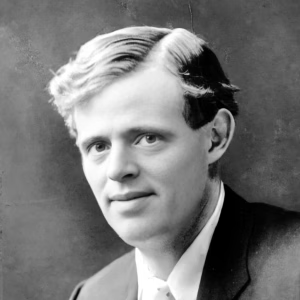
Jack London was a force of nature distilled into a man—a life as rugged and compelling as the stories he would come to tell. He was born John Griffith Chaney in San Francisco, California, on January 12, 1876. His mother, Flora Wellman, named astrologer William Chaney as the father—a claim Chaney denied, citing impotence. While the matter was never definitively resolved, London retained the Chaney name in early life and later adopted the pen name by which he became famous.
Jack London faced early adversity. Denied acknowledgment by the man Flora Wellman identified as his father, he grew up in relative poverty under the care of his mother, a spiritualist and music teacher. His formal education ended at age thirteen, but this lack of schooling only fueled an insatiable hunger for knowledge, which he pursued through the streets, libraries, and relentless life experience.
London’s life was one of constant reinvention. He worked as a factory worker, oyster pirate, sailor, gold prospector—each occupation leaving its indelible mark on his writing. The Klondike Gold Rush of 1897 proved pivotal. Though he didn’t strike it rich in the traditional sense, he found a wealth of material and inspiration in the harsh beauty and brutal realities of the Yukon Territory. This experience birthed some of his most enduring works, including The Call of the Wild and White Fang, establishing him as a leading voice in naturalistic literature.
London’s style was uniquely potent—a blend of stark realism, vivid imagery, and a philosophical undercurrent exploring themes of survival, primal instinct, and the struggle against overwhelming forces. He didn’t shy away from depicting violence or the darker aspects of human nature, but always with an unflinching honesty that resonated deeply with readers. His prose was direct, muscular, often echoing the rhythms of speech, yet capable of moments of surprising lyricism.
Compared to contemporaries like Theodore Dreiser and Frank Norris—fellow practitioners of naturalism—London possessed a distinct adventurous spirit. While Dreiser meticulously dissected societal ills, and Norris focused on economic determinism, London’s narratives frequently centered on individual resilience in the face of untamed landscapes and elemental challenges. He infused his work with a romantic fascination for the primitive, a yearning for a simpler existence unburdened by the complexities of civilization. His characters weren’t merely victims of circumstance; they were often active agents grappling with their own inner demons and the unforgiving laws of nature.
The Scarlet Plague, published in 1912, stands as a chillingly prescient work within London’s oeuvre. It is a stark warning about the fragility of civilization, imagining a world decimated by a swift and merciless pandemic. The story, set in a post-apocalyptic California, offers a haunting glimpse into a future where societal structures have collapsed and humanity has regressed to a primitive state. Its historical context—written during a period of growing anxieties surrounding disease outbreaks and social upheaval—lends it an unsettling relevance even today.
London’s influence extended beyond the literary world. He was a vocal socialist, advocating for workers’ rights and challenging the prevailing capitalist system. His commitment to his beliefs, coupled with his adventurous life and compelling storytelling, made him a cultural icon. Though he faced personal struggles—including alcoholism and depression—Jack London’s legacy of powerful narratives continue to captivate and challenge readers over a century later, reminding us of both the enduring strength and inherent vulnerability of the human spirit. He died on November 22, 1916, leaving behind a body of work as wild and untamed as the landscapes he so vividly portrayed.